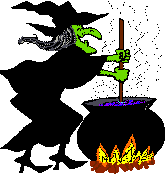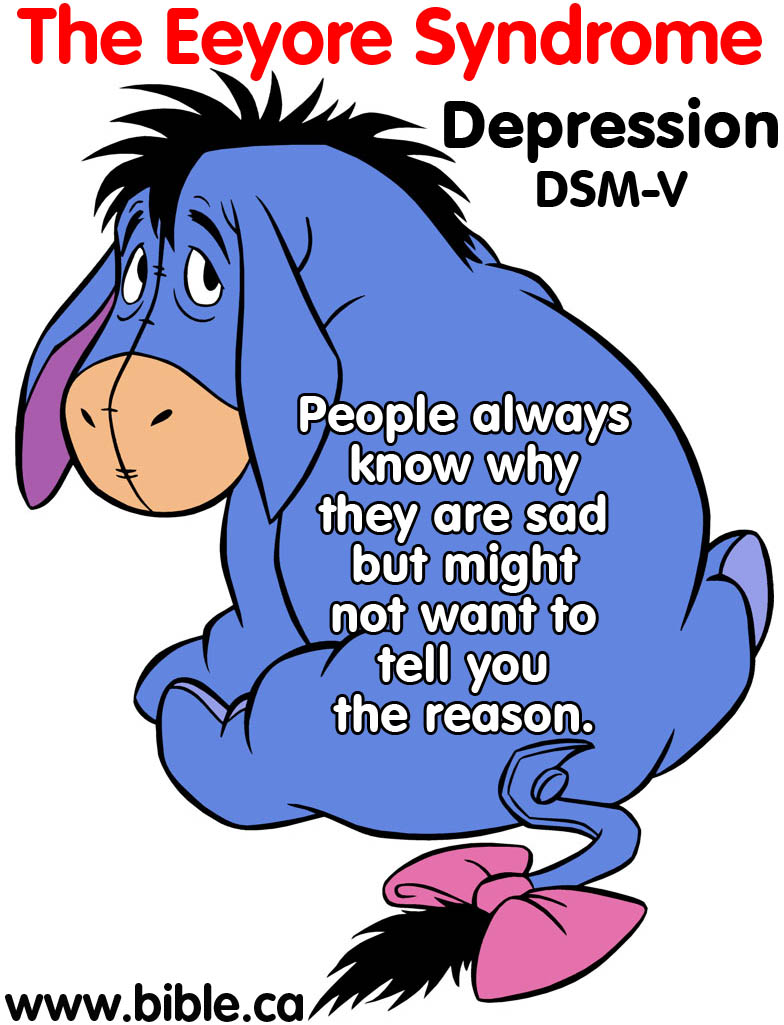Seasonal
Affective Disorder, (SAD) is pure "classic" Junk science.
Winter Blues
|
|
Psychiatry is Junk science |
|
Seasonal Affective Disorder Debunked See the Case of Eeyore: |
Introduction:
- "Seasonal Affective Disorder" (SAD) ranks among the best examples of pure junk science. The basic theory is that changes in the annual photo period induce a chemical imbalance in the brain causing depression. This is about as scientific as the "fact" that women menstruate in sync with the full moon. Strangely, 80% of SAD "sufferers" are women.
- So why would someone make themselves sad with the approach of winter?
- SAD affects 80% women probably for the same reason they make their men keep the windows rolled up in the car and the heat cranked up in the house, while they sit around wrapped up in blankets watching reruns of the Bachelor. Women generally hate cold more than men. They are also more fashion conscious than men and high heels don't work well in slush.
- Canadians generally vacation in Florida in the winter to escape unpleasant weather. The tourist industry in Canada is not driven by huge numbers of Floridian's vacationing in Canada in the winter months.
- If you lived in the far north you would not anticipate with gladness the approaching 3 month period of darkness.
- Inuit do not throw a festival in anticipation of the 3 miserable, cold winter months of darkness. Who would look forward for having to crawl into a cold igloo for three long dark months? The effect of lack of sunlight on brain chemistry is junk science.
A. SAD "Studies" are worthless:
- Studies are conducted to chart latitude and the frequency of seasonal depression. So the theory goes, the farther north you live, the greater the percentage of the population that have SAD. Eskimo/Inuit, Iceland, Greenland populations have been studied and found to have a higher rate of SAD then those living at the equator, etc. The problem is that such studies are entirely subjective and worthless and are about as scientific as the study that found one in four people on earth have a "mental disease".
- Then there are studies like this that show the opposite of SAD:
- Depression peaks in Greenland in mid-summer when the sun never sets.
- Swedish researchers Karin Sparring Björkstén from the Karolinska Institutet, Sweden, conducted a longitudinal study on suicide in relation to seasons in Greenland (1968-2002 AD) and said, "In terms of seasonal light variation, Greenland is the most extreme human habitat. Greenland also has one of the highest suicide rates in the world. We found that suicides were almost exclusively violent and increased during periods of constant day. In the north of the country, 82% of the suicides occurred during the daylight months (including astronomical twilight)" … "Light is just one of many factors in the complex tragedy of suicide, but this study shows that there is a possible relationship between the two." (Accentuation of suicides but not homicides with rising latitudes of Greenland in the sunny months, Karin S Björkstén, Daniel F Kripke and Peter Bjerregaard, BMC Psychiatry, 2009)
- In 1758 AD, William Battie, mad doctor of Bedlam asylum, observed depression was caused by too much sun which heated up the brain wiring causing insanity.
- In the exact opposite to modern psychiatry's "SAD" or Seasonable affective disorder, Battie observed cases of madness that were triggered immediately by exposure to sunlight.
- "One case of Consequential Madness that proves the intervention of such pressure is an effect of Insolation or what the French call coup du soleil. An instance of which I lately met with in a Sailor, who became raving mad in a moment while the Sun beams darted perpendicularly upon his head. Which maniacal effect of heat could be attributed to no assignable cause, except either to the violent impression of the Sun's rays, upon the medullary substance of the brain, which the cranium in this case was not able to defend, or to the intermediate rarefaction of blood contained in the vessels of the Dura or Pia Mater, which vessels being suddenly distended compressed the same medullary substance." (A Treatise on Madness, William Battie, 1758 AD, p 47)
- Like his modern Biopsychiatric counterparts, Battie was looking for a mechanical etiology of behaviour. The truth is that all mood and behaviour is a choice of the spirit, not the body.
- So one "study" concludes lack of sunlight in Sweden causes depression and another concludes too much sunlight causes depression. The obvious stupidity of this junk science should be readily obvious to all.
B. Biopsychiatry: photo-period causes Chemical imbalances
- SAD (Seasonal Affective Disorder) It is caused by a biochemical imbalance in the hypothalamus due to the shortening of daylight hours and the lack of sunlight in winter. ... The non-sedative SSRI drugs such as sertraline (Lustral), paroxetine (Seroxat) and fluoxetine (Prozac) are effective in alleviating the depressive symptoms of SAD and combine well with light therapy. (SAD Association, England, No. 800917, "the world's longest surviving support organization for Seasonal Affective Disorder")
- Seasonal Affective Disorder, SAD: If you notice periods of depression that seem to accompany seasonal changes during the year, you may suffer from seasonal affective disorder (SAD). This condition is characterized by recurrent episodes of depression - usually in late fall and winter - alternating with periods of normal or high mood the rest of the year. Most people with SAD are women whose illness typically begins in their twenties, although men also report SAD of similar severity and have increasingly sought treatment. ... Treatment: Light therapy is now considered the first-line treatment intervention, and if properly dosed can produce relief within days. Antidepressants may also help, and if necessary can be used in conjunction with light. ... Bright white fluorescent light has been shown to reverse the winter depressive symptoms of SAD. (Seasonal Affective Disorder, SAD, NAMI, National Alliance on Mental Illness, Michael Terman, Ph.D., February, 2004)
C. Photoperiod and the Snowshoe Hare:
- Now there is science behind photo period triggering changes in plants and animals.
- Leaves fall, birds migrate and Showshoe Hares change the colour of their fur based on a ridged, involuntary and always predictable calendar timetable.
- Nothing like this is observed in the "winter blues disease".
- Further, controlled indoor "light therapy" on Snowshoe Hares can artificially manipulate the colour of the pelt.
- Studies have shown that the Snowshoe Hare is not even aware of how the change in pelt colour might help or hinder its personal survival. For example, a brown hare does not get stressed when in snow out of fear of being visible to predators and conversely as well. But the Snowshoe hair really should be stressed because predation dramatically increases in the fringe months of fall and spring when their coat colours often do not match their environment. This is clearly a creation designed by God where the animal is not aware of the matter the way humans can clearly see. While the pelt colour change benefits the rabbit in mid-winter, it benefits predators in early spring when food is critical to their survival. Neither the rabbit nor the lynx are aware of this design as both species exist in symbiosis. Praise be to God!
- The fact that lightbult therapy has a marginal effect on depression easily explained by the placebo effect. And the fact that 100% of Snowshoe Hares' pelts change as photo period varies exposes the fraud of behaviour in human's being "dependent upon the photoperiod".
- If humans were snowshoe hairs, they would have real cause for depression if they had white fur during an early mid-winter thaw.
- Likewise, there are an almost infinite number of simple, explainable social and circumstantial reasons why people become sad with the onset of winter.
- Treatment of "SAD" with lightbulbs and psychiatric drugs is pure medical malpractice.
D. Cases of depression and anxiety:
|
Depression in the DSM-5 |
|
|
Candy, Muffin, Abba, Potato, Egg, Deferred, River, Amnon See the Case of Eeyore: (The Eeyore Syndrome: High self-esteem depression disorder) |
|
|
Panic Disorder (PD) |
|
|
Postpartum Depression (PPD) |
|
|
|
|
|
Social Phobia (SP) |
|
Conclusion:
- SAD reminds me of the proposed recent addition to the DSM-5 of the disease called, "Snowmobilitis".
- Men who have bought a new Skidoo get real sick with the lack of snow but are cured with the first snowfall.
- Perhaps spending an hour a day in the deep freezer in the garage cure them like an hour a day under a light bulb cures SAD. SAD is just ridiculous junk science.
- Don't get me wrong, there is clearly a direct correlation between the onset of winter and depression. It’s the cause and effect and cure I take issue with this classic pop-psychology of biopsychiatry.
- A photo therapy light? How utterly ridiculous! The notion of curing "Winter blues" with a light bulb smacks of Mesmer's historic magnetic and hypnotic cures for insanity, the Qray energizing bracelet and the "Shakti Helmet". I mean really. Step back and think about this. The placebo and nocebo effects are working in full force here.
4. All behaviour is a choice. Depression is a choice and if you ask you will discover the reason.
a. When a SAD "sufferer" is asked what they are sad about and they reply, "I don't know why I am sad", reject it as a lie and ask again.
b. People always know why they have chosen to mope around like Eeyore. See the Case of Eeyore: (The Eeyore Syndrome: High self-esteem depression disorder)
c. However, most depressions are caused by high self-esteem because the person thinks they are better than, or do not deserve their current life situation. Being content in whatever circumstance is in important virtue Christians are to exhibit.
d. Depression is a sinful behaviour choice in light of the fact the Bible commands us to rejoice in our hope of heaven in spite of earthly persecution, trials and tribulation.
e. This kind of thinking will always be rejected by biopsychiatry, but then they are atheists who hate the Bible and base their life values on Darwinism.
5. The history of psychiatry is one of harming and disabling the human body with surgery, shocks and drugs. The harm non-Christians endure at the hand of chemical psychiatrists is the price they pay for rejecting the Bible as their behaviour manual. For Christians it is a breach of faith.
By Steve Rudd: Contact the author for comments, input or corrections.
Send us your story about your experience with modern Psychiatry


